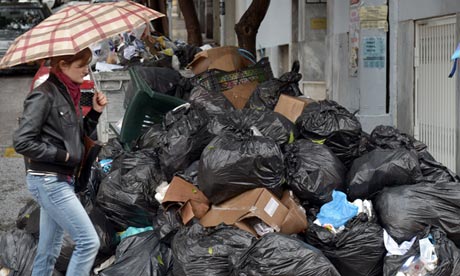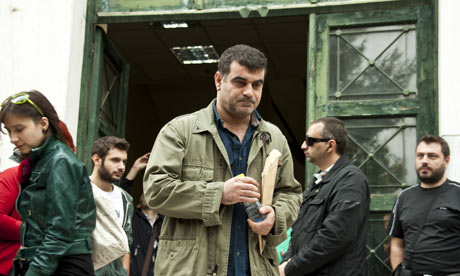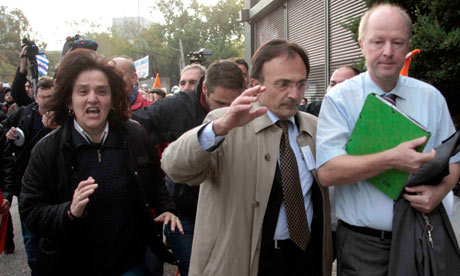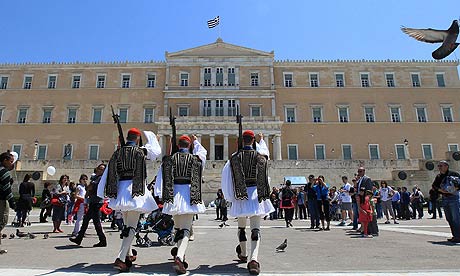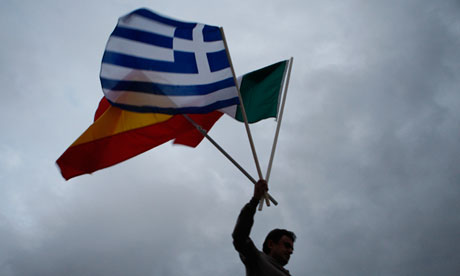Julia Kollewe and Martin Farrer guardian.co.uk, Thursday 29 November 2012 18.31 GMT
EU court throws out freedom of information request relating to credit swaps which allowed the country to increase its debts
Greece's finance minister Yannis Stournaras arrives for a news conference in Athens this week following news that the EU and IMF had agreed a €40bn bailout. Photograph: Yorgos Karahalis/Reuters
The EU's general court has blocked an attempt to force the European Central Bank to release files showing how Greece used derivatives to hide its debt in the run-up to the financial crisis. The case was brought by Bloomberg News under the EU's freedom of information rules in August 2010 but was thrown out on Thursday by the court in Luxembourg.
"Disclosure of those documents would have undermined the protection of the public interest so far as concerns the economic policy of the EU and Greece," the EU's general court said.
Goldman Sachs and other investment banks have been criticised by European leaders over claims that they helped Greece disguise the true scale of its debts over several years. German chancellor Angela Merkel said in February 2010: "It's a scandal if it turned out that the same banks that brought us to the brink of the abyss helped to fake the statistics."
The ECB is headed by a former Goldman banker, Mario Draghi.
The ruling means European taxpayers who are footing the bill for the €240bn Greek bailout will not find out whether EU officials knew of irregularities in Greece's national accounts before they became public in 2009.
Georg Erber, a specialist in financial market regulation at the German Institute for Economic Research, told Bloomberg: "The courts are bending the rules to legalise the policies of the European institutions and help stabilise the region. It reveals implicitly that the EU was well informed about what was going on and didn't take steps to avert the crisis."
Bloomberg sought access to two internal papers drafted for the ECB's six-member executive board. In April 2009, ECB officials spotted a "swap operation in unusual terms" involving the National Bank of Greece, according to a cover note to the two documents seen by Bloomberg. From October 2009, repeated revisions of Greece's budget figures drove up the country's borrowing costs and eventually forced it to seek aid from the EU and the International Monetary Fund.
Euro stat accounting rules allowed member states to use off-market rates in swaps to manage their debt until 2008. The use of swaps, which Greece had not disclosed as debt, allowed the country to increase borrowings by €5.3bn (£4.3bn), Euro stat said in 2010. In the largest derivative disclosed, Greece borrowed €2.8bn from Goldman Sachs in 2001.
The mood on stock markets was lifted by optimism that US lawmakers will be able to avoid the "fiscal cliff" of higher taxes and spending cuts looming in the new year. Republican speaker John Boehner said his party could broker a deal with the White House while Barack Obama said he thought it could be done by Christmas.
The comments propelled the FTSE 100 index in London to three-week highs. It closed up nearly 70 points, or 1.2%, at 5870.30 while Germany's Dax gained 0.8% and France's CAC rose 1.5%.
David Madden, market analyst at spread betting firm IG, said the comments "have filled investors with confidence that the US economy will not plunge into a recession come new year. However, just because Mr Obama says everything will be OK doesn't make it so, and dealers will want more than words as we approach the deadline.
"I think we are in for a see-saw ride on the run-up to Christmas, as traders closely follow politicians' statements – take last night for example. All we need is an 'optimistic' outlook to move the market higher but if there is any doubt that a deal will not be in place, we will see another sell-off."
The better mood was also helped by an increase in business and economic confidence in November in Europe which ended eight monthly declines in a row, while German unemployment rose by less than feared, leaving the jobless rate at 6.9%.
Bond yields in struggling euro zone countries fell in the wake of a successful Italian bond auction and the Greek deal earlier in the week, with Italian 10-year yields briefly touching levels last seen in December 2010. Italy sold €2.98bn of 10-year bonds, just shy of the maximum targeted amount, and paid a yield of 4.45%, down almost 50 basis points from a sale at the end of October. A year ago, Italy paid a record 7.56% to get 10-year bonds away.
New data also showed the American economy grew faster than previously thought in the third quarter, by an annual rate of 2.7% rather than the 2% estimated by the government last month. This was due to companies building up stocks more quickly than thought but is not expected to be sustained as the nation prepares for tax increases and spending cuts.
Court blocks release of Greek accounts | Business | guardian.co.uk
![The [Greek] European Tragedy](https://blogger.googleusercontent.com/img/b/R29vZ2xl/AVvXsEiWKI5s90SFm1wWTk6bs4p7CgslaC2SnYPsrZhb-B-smOufNNCSxCvpBLI9hOB-LsXZjir_PNmEiMk2-E62F3xkg96IoC6QFAaZAnPRTVH340IN9WBRmWJqPkjWlgyRj3zpALp7h6hvA58/s920/GkBack_new.jpg)


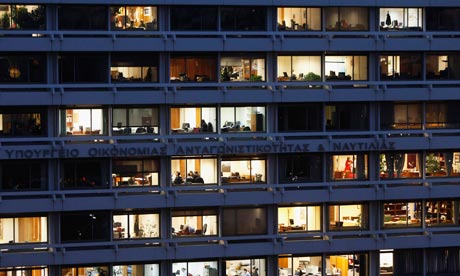


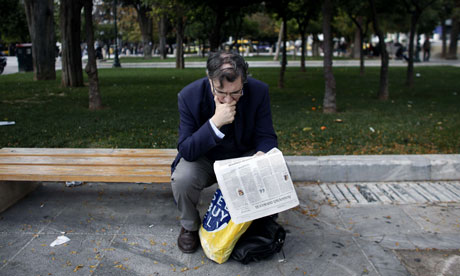
;)







